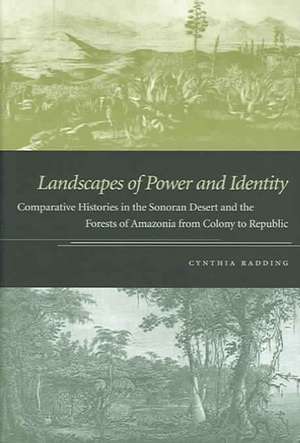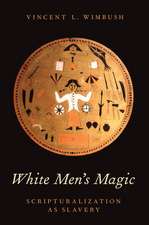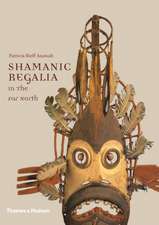Landscapes of Power and Identity – Comparative Histories in the Sonoran Desert and the Forests of Amazonia from Colony to Republic
Autor Cynthia Raddingen Limba Engleză Paperback – 17 ian 2006
Preț: 302.53 lei
Nou
Puncte Express: 454
Preț estimativ în valută:
57.92€ • 60.32$ • 48.06£
57.92€ • 60.32$ • 48.06£
Carte tipărită la comandă
Livrare economică 14-28 februarie
Preluare comenzi: 021 569.72.76
Specificații
ISBN-13: 9780822336891
ISBN-10: 0822336898
Pagini: 456
Ilustrații: 28 b&w photographs
Dimensiuni: 159 x 237 x 32 mm
Greutate: 0.65 kg
Editura: MD – Duke University Press
ISBN-10: 0822336898
Pagini: 456
Ilustrații: 28 b&w photographs
Dimensiuni: 159 x 237 x 32 mm
Greutate: 0.65 kg
Editura: MD – Duke University Press
Recenzii
This is a beautifully written comparative frontier history that balances in-depth historical analysis of two relatively unexplored regions on the edge of the Spanish empire against broader insights into the active role that ecologies played in shaping the contours of European-indigenous encounters and processes of colonization over long periods of time. With this book, Cynthia Radding takes the new environmental history of conquest and colonization to a new level.Brooke Larson, author of Trials of Nation Making: Liberalism, Race, and Ethnicity in the Andes, 18101910There has been much talk about comparative history but precious little of it in the Spanish colonial period. Cynthia Radding has led the way. David J. Weber, Director of the William P. Clements Center for Southwest Studies, Southern Methodist University[A] deeply original work of historical scholarship that opens multiple pathways of analysis into indigenous societies, colonialism, and the environment in Latin America. . . . It deserves wide readership among ethnohistorians, environmental historians, and scholars interested in state-of-the-art comparative history.Christopher R. Boyer, A Contracorriente
Notă biografică
Cynthia Radding is Professor of History and Director of the Latin American and Iberian Institute at the University of New Mexico. She is the author of "Wandering Peoples: Colonialism, Ethnic Spaces, and Ecological Frontiers in Northwestern Mexico, 1700-1850," also published by Duke University Press.
Textul de pe ultima copertă
"There has been much talk about comparative history but precious little of it in the Spanish colonial period. Cynthia Radding has led the way."-- David J. Weber, Director of the William P. Clements Center for Southwest Studies, Southern Methodist University
Cuprins
List of Illustrations ix
Abbreviations xiii
Preface xv
Acknowledgments xxi
Introduction. Savannas and Deserts: Two Histories of Cultural Landscapes 1
1. Ecological and Cultural Frontiers in Sonora and Chiquitos 19
2. Political Economy: Communities, Missions, and Colonial Markets 55
3. Territory: Community and Conflicting Claims to Property 89
4. Ethnic Mosaics and Gendered Identities 117
5. Power Negotiated, Power Defied: Politial Culture, Governance, and
>6. Priests and Shamans: Spiritual Power, Ritual, and Knowledge 196
7. Postcolonial Landscapes: Transitions from Colony to Republic 240
8. Contested Landscapes in Continental Borderlands 295
Notes 327
Glossary 375
Bibliography 385
Index 423
Abbreviations xiii
Preface xv
Acknowledgments xxi
Introduction. Savannas and Deserts: Two Histories of Cultural Landscapes 1
1. Ecological and Cultural Frontiers in Sonora and Chiquitos 19
2. Political Economy: Communities, Missions, and Colonial Markets 55
3. Territory: Community and Conflicting Claims to Property 89
4. Ethnic Mosaics and Gendered Identities 117
5. Power Negotiated, Power Defied: Politial Culture, Governance, and
>6. Priests and Shamans: Spiritual Power, Ritual, and Knowledge 196
7. Postcolonial Landscapes: Transitions from Colony to Republic 240
8. Contested Landscapes in Continental Borderlands 295
Notes 327
Glossary 375
Bibliography 385
Index 423
Descriere
This comparative frontier history explores the role that natural environments played in shaping the contours of European-indigenous encounters and processes of colonization













